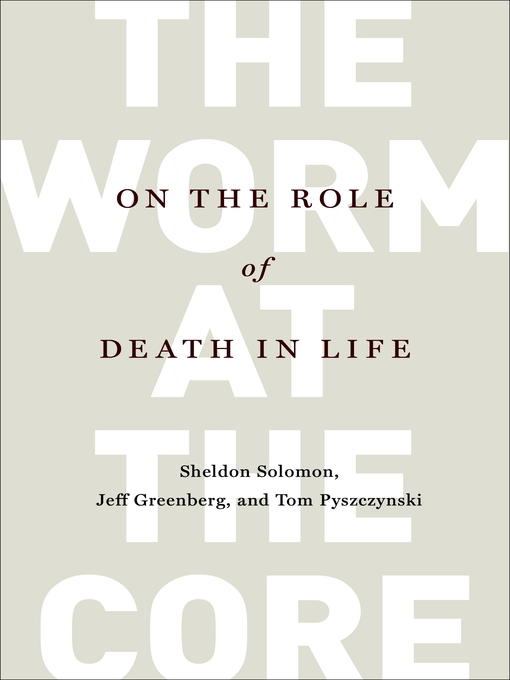
The Worm at the Core
On the Role of Death in Life
کتاب های مرتبط
- اطلاعات
- نقد و بررسی
- دیدگاه کاربران
نقد و بررسی

March 2, 2015
Social psychologists Solomon, Greenberg, and Pyszczynski provide an intriguing but uneven volume aimed at lay readers that attempts to show that humanity’s unique awareness of death “has a profound and pervasive effect on our thoughts, feelings, and behaviors in almost every domain of human life—whether we are conscious of it or not.” They cite a number of interesting experiments that contrast the behavior of subjects made more aware of mortality with those who are not. Readers might be surprised to learn that judges belonging to the first category sentenced prostitutes more harshly than their colleagues in the second. The authors explain that those forced to think “about their own mortality by trying to do the right thing as prescribed by their culture.” The language sometimes lapses into cliché (“We have a lot to learn from the ancients”) or overstatement. For all the book’s arguments, some readers will arrive at the end unconvinced that every instance of human cruelty to other humans “stems from humankind’s fundamental intolerance of... those who subscribe to different cultural worldviews.”

January 1, 2015
Psychology professors Solomon (Skidmore Coll.), Greenberg (Univ. of Arizona) and Pyszczynski (Univ. of Colorado, Colorado Springs) follow up their study of the psychological effects of 9/11 on the American population (In the Wake of 9-11: the Psychology of Terror, 2003) with a look at how the knowledge of mortality impacts human culture.The authors' contention that fear of death has been a primary driving force of human culture is controversial, but its relevance in incontestable. They began working together on the elaboration of what they now call "Terror Management Theory" in the 1970s when they were doctoral candidates in experimental social psychology. Although other species appear to mourn their dead, only humans are aware of their own mortality and terrified by this knowledge. "The awareness of death," write the authors, "arose as a byproduct of early humans' burgeoning self-awareness...hurling our terrified and demoralized ancestors into the psychological abyss." This inspired their creation of "a supernatural universe that afforded a sense of control over life and death" and the possibility of immortality. In the authors' view, it was the practice of religious rituals associated with these beliefs that spurred the development of social organization and technology, as well as medical advances. The authors offer accounts of their experiments as evidence to buttress their contention that under stress, we look for social stability. In one, subjects were asked to evaluate candidates' statements in a hypothetical gubernatorial election. After subjects were given a reminder of death, their choices switched dramatically to favor a charismatic leader. Conversely, challenges to the accepted social order were shown to evoke thoughts of death. The authors also examine how we are motivated by conscious thoughts of death, subliminal reminders of which we are consciously unaware can elicit more powerful, potentially destructive defenses responses. Insightful but not entirely convincing.
COPYRIGHT(2015) Kirkus Reviews, ALL RIGHTS RESERVED.

February 15, 2015
Rather than confronting the issue of death itself, this book analyzes how human affairs are affected by anxiety about it. Drawing from the work of Ernest Becker (The Denial of Death), authors Solomon (psychology, Skidmore Coll.), Jeff Greenberg (psychology, Univ. of Arizona), and Tom Pyszczynski (psychology, Univ. of Colorado-Colorado Springs), all of whom previously collaborated on In the Wake of 9/11 have reportedly spent the last quarter century investigating this topic. The first section outlines their "terror management theory" and discusses coping mechanisms for dealing with this universal fear, including cultural/religious supports and self-esteem. The early history of death awareness and immortality beliefs is then discussed. Contemporary research findings are reviewed, revealing the negative effects of death-dread on specific attitudes and behavior including feelings towards outsiders, bodily distaste, psychological disorders, smoking, and attitudes toward domestic violence. The final chapter considers nondestructive ways of dealing with the reality of the end of life. This tightly argued, wide-ranging work summarizes a large body of social science research in a readable manner. Although the discussion of religion and supernatural constructs may be controversial and the focus on existential psychotherapy as treatment for mental illness ignores the reality of more popular evidence-based therapies, this book could complement less-theoretical volumes on the subject, such as Elizabeth Kubler-Ross's On Death and Dying. VERDICT An intriguing and impressive summary of terror management theory and research suited to intellectually inclined general readers and students.--Antoinette Brinkman, formerly with Southwest Indiana Mental Health Ctr. Lib., Evansville
Copyright 2015 Library Journal, LLC Used with permission.

























دیدگاه کاربران